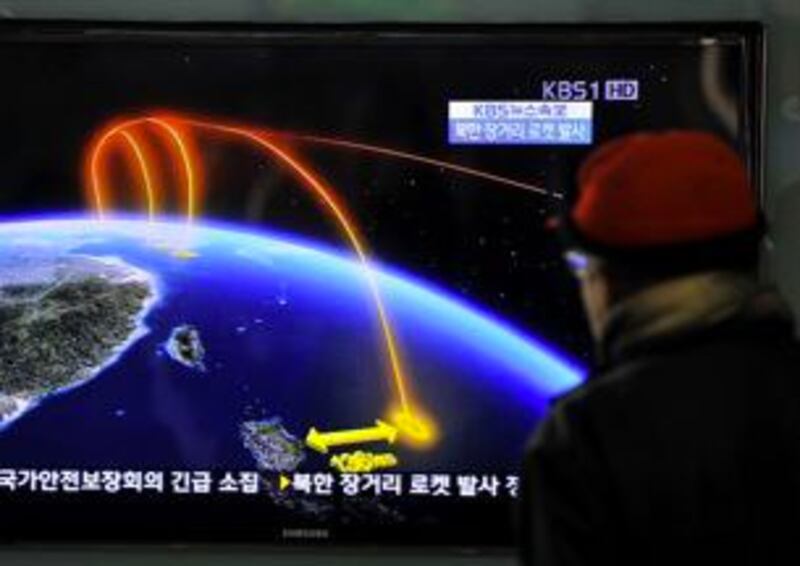North Korea launched its second long-range rocket of the year on Wednesday morning, claiming that it had successfully placed a satellite into orbit, according to official media.
"The launch of the second version of our Kwangmyongsong-3 satellite from the Sohae Space Center ... on December 12 was successful," the state-run Korean Central News Agency reported.
News of the liftoff came as a surprise following reports on Tuesday that the North had removed the Unha-3 rocket from its launchpad for repairs based on analysis of satellite imagery by a South Korean military source. Pyongyang had also extended the rocket's launch date by a week.
Plans for the launch had drawn widespread concern from nations who said the move would violate restrictions based on U.N. Security Council requirements.
Pyongyang maintains that its rocket launches are part of a “peaceful” space program, but many countries seeking to end North Korea’s buildup of arms believe they are part of an effort to build a missile arsenal capable of targeting the U.S.
North Korea is under U.N. sanctions which ban the nation from trading missiles or nuclear technology, and the U.S., Japan, and South Korea had threatened further measures through the U.N. Security Council if the launch was not called off entirely.
Initial reports suggested that portions of the rocket had fallen into the sea off of the coast of South Korea, with additional material falling into waters near the Philippines, although those had yet to be confirmed.
According to an earlier statement by Pyongyang, the rocket's flight plan involved the rocket’s first stage dropping off the west coast of the Korean Peninsula, while the second-stage drop would occur off the Philippines.
Agence France-Presse reported that officials in South Korea and Japan had confirmed that all three stages of the rocket appeared to have separated as scheduled.
However, it quoted South Korean Defense Ministry spokesman Kim Min-Seok as cautioning that further analysis was required.
"There are many factors to determine whether it was successful or not .... We need more extensive analysis. We need more consultation with the United States since our own capability is limited," Kim said.
Reports of the launch immediately drew condemnation from the international community.
U.S. National Security Council spokesman Tommy Vietor called North Korea’s launch "a highly provocative act" which threatened regional security and directly violated United Nations Security Council resolutions.
"This action is yet another example of North Korea’s pattern of irresponsible behavior. The United States remains vigilant in the face of North Korean provocations and fully committed to the security of our allies in the region," he said in a statement.
"Given this current threat to regional security, the United States will strengthen and increase our close coordination with allies and partners."
AFP quoted South Korea Foreign Minister Kim Sung-Hwan who condemned North Korea's rocket launch as a flagrant violation of U.N. resolutions and a threat to stability on the Korean peninsula and to the world at large.
"Our government strongly condemns, along with the international community, North Korea for ignoring repeated warnings and requests to cancel the launch and carrying on with such provocations," Kim said, adding that the North would be held accountable.
AFP quoted an unnamed Western diplomat as saying that following a Japanese request, the U.N. Security Council will meet Wednesday to discuss the launch.
"The Japanese and the Americans have requested a Security Council meeting, which will take place late Wednesday morning" around 11:00 a.m., the diplomat said.

Call for measures
Reports of the launch follow an unsuccessful attempt in April, when a rocket was reported to have exploded shortly after liftoff and broken up off South Korea’s western coast.
The fresh launch attempt is timed to coincide with the first anniversary of the death of former leader Kim Jong Il, who is believed to have succumbed to a heart attack in December last year, thrusting his son Kim Jong Un into power.
Bruce Klingner of the Washington-based Heritage Foundation called the reported launch a “clear violation of U.N. Security Council Law.”
He called on the U.S. to “lead a charge” along with its allies to pressure the U.N. Security Council on implementing new measures against North Korea in light of the launch.
He added that China—the North’s biggest ally—must take a sterner tone with Pyongyang ahead of such actions, but said that it remains to be seen how a once-in-a-decade leadership change in Beijing last month may shift bilateral relations.
“China has been the stumbling block to firmer U.N. action, and we’ll have to wait and see if the new leadership will act any differently than its predecessors,” he said.
Klingner said it was too early to say whether the rocket launch had gone according to Pyongyang’s plans.
“In the past, even when rockets blew up, North Korea claimed it was a success. Now, North Korea is more open to the media, so we’re not sure if [today’s claim] was an accurate statement.”
“But even if they didn’t put a satellite in orbit … that could be a bit of an eye-opener for those who have dismissed [the North’s capabilities].”
In addition to last April's rocket launch, North Korea fired long-range missiles in March 2009, July 2006, and August 1998.
Pyongyang has said it successfully put satellites into orbit, though international space and defense experts have never detected a North Korean satellite.
Reported by Joshua Lipes.
